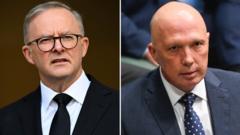With the federal election on the horizon, major issues like cost-of-living, housing affordability, and Australia's climate commitments will dominate discussions.
**Australia's Federal Election Scheduled for May 3 Amidst Tight Race**

**Australia's Federal Election Scheduled for May 3 Amidst Tight Race**
Australia's Prime Minister Anthony Albanese announces election date as he faces tough competition from Liberal leader Peter Dutton.
Australia is set to hold its federal election on May 3, as Prime Minister Anthony Albanese and the Labor Party brace for a tight contest against Peter Dutton and the Liberal-National Coalition. Announcing the election date from Parliament House, Albanese is keen to defend his party's slim majority amidst predictions of a closely contested race.
Polls suggest a narrow margin between the two major parties, indicating that either might need to collaborate with independent MPs or minor parties to form the next government. The recent elections saw these smaller parties secure a record share of the vote, underscoring the shifting political landscape.
Cost-of-living concerns are projected to take center stage in the upcoming campaign. Albanese aims to position Labor as the party committed to continued progress, vowing improvements in free healthcare, student debt relief, and targeted tax reductions. He stated, "Elections should reflect hope and optimism unlike the fear-based agenda of my opponent." Dutton, however, contends that Labor’s policies have led to economic hardships and has proposed austerity measures such as reducing immigration and public service funding to “get Australia back on track.”
With the Greens gaining traction in the previous elections, they are urging voters to support them to hold Labor accountable on environmental and housing issues. Their leader, Adam Bandt, remarked on the necessity of a minority government, signaling diminishing enthusiasm for the major party platforms.
As voters prioritize housing, grocery affordability, healthcare access, and rising crime influences, climate action also remains urgent for a significant segment of Australians. For a party to secure a majority in the House of Representatives, at least 76 out of 150 seats are required.
Albanese, who came into power during a period of significant political upheaval, remains committed to advancing climate conversations and policies after promising to end what he has termed “the climate wars.” Despite initiating a strengthened emissions reduction target and carbon initiatives, many experts argue that Australia still must ramp up its climate ambitions.
Surprisingly, Albanese faced criticism last year over personal property purchases amidst a widespread national housing crisis, complicating his administration’s position going into the election. Dutton, with a history of hardline policies, has been recalibrating his public image, hoping to attract voters seeking more moderate leadership in a changing political environment.
As the election date approaches, the significance of voter engagement and preference will be clearer than ever in shaping Australia’s immediate political future.


















